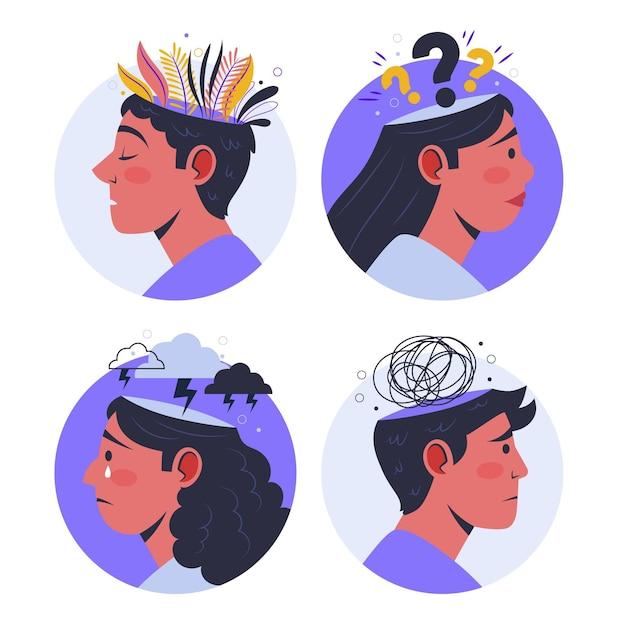Personality is a fascinating aspect of human behavior that shapes who we are and how we interact with the world around us. Have you ever wondered what makes someone outgoing, while another person prefers to stay home and read a good book? Or why some individuals seem to handle stress with ease, while others crumble under pressure? These differences in behavior and temperament can be explained by the concept of personality.
In psychology, personality is defined as the unique set of characteristics, behaviors, and patterns of thinking that define an individual. Psychologists study personality to better understand why people think, feel, and behave the way they do. One popular approach used by psychologists to describe personality is through traits. Traits are relatively stable and enduring characteristics that influence our thoughts, feelings, and behaviors across different situations.
In this blog post, we will delve into the world of personality and explore how psychologists utilize traits to describe individual differences. We will also uncover the intriguing concepts of Type C and Type D personalities, shedding light on their unique characteristics. So, if you’re curious about what makes you who you are or have ever wondered how psychologists decipher personality, keep reading!

What is Personality? How Do Psychologists Use Traits to Describe Personality
Personality is a fascinating aspect of human behavior that makes each of us unique. It’s like the special sauce that adds flavor to our individual selves. But what exactly is personality? Well, let’s dive in and find out!
Understanding the Quirks of Personality
Personality refers to the patterns of thoughts, feelings, and behaviors that make up who we are. It’s like the software running in our minds that influences how we interact with the world around us. Whether you’re an introvert who loves spending Friday nights curled up with a book or an extrovert who thrives on socializing, your personality is what shapes these inclinations.
What Makes You, You
Now, let’s explore how psychologists use traits to decipher the intricacies of personality. Think of traits as the building blocks of your personality blueprint. These are enduring characteristics that tend to be consistent across different situations. Just like some people are kind-hearted and compassionate, others may be more assertive and ambitious.
The Big Five: Unraveling Personality Traits
Psychologists have identified five core personality traits, known as the Big Five, to capture the broad spectrum of human personalities. These traits are extraversion, agreeableness, conscientiousness, neuroticism, and openness to experience.
- Extraversion: Are you the life of the party or do you prefer quiet evenings at home? Extraversion measures how outgoing and sociable you are.
- Agreeableness: Are you warm and friendly or more skeptical and competitive? Agreeableness gauges your level of empathy and cooperativeness.
- Conscientiousness: Are you organized and reliable or more of a laid-back go-with-the-flow type? Conscientiousness reflects your tendency to be disciplined and responsible.
- Neuroticism: Are you easily stressed or do you stay calm under pressure? Neuroticism evaluates your emotional stability and anxiety levels.
- Openness to Experience: Are you open-minded and curious or more conventional and routine-oriented? Openness to experience measures your creativity and adventurousness.
Unveiling the Hidden Depths
While the Big Five provide a handy framework for describing personality, it’s important to note that they don’t capture every nuance. Each individual is like an intricate tapestry woven with unique threads of personality. Psychologists dig deeper, examining additional traits, such as honesty, assertiveness, or even a quirky obsession with collecting cactus-shaped fridge magnets, to unravel the intricacies of your distinct personality.
A Personality Puzzle Worth Solving
Understanding personality is like solving a captivating puzzle—one that reveals the intricate workings of the human mind. By studying the different dimensions of personality, psychologists gain insights into how people think, feel, and behave. This knowledge helps them understand why some individuals excel in certain careers, while others thrive in social situations or prefer solitary pursuits.
So, whether you’re an introverted bookworm, an adventurous free spirit, or a meticulously organized multitasker, your personality is what makes you wonderfully and unapologetically unique. Embrace your quirks, celebrate your strengths, and let your vibrant personality shine!

FAQ: Understanding Personality and Traits
Welcome to our comprehensive FAQ-style guide on understanding personality and traits! In this section, we’ll tackle some common questions about personality and delve into how psychologists use traits to describe it. So, let’s jump right in and explore this captivating topic!
What is Personality and How Do Psychologists Use Traits to Describe It
Personality is like the unique flavor that makes each of us a distinct scoop of ice cream in the grand tub of humanity. It encompasses a set of characteristics, behaviors, and patterns of thinking that shape who we are as individuals. But how do psychologists make sense of this melting pot?
Psychologists use traits, which are like the secret ingredients that give each personality its distinct taste. Traits are enduring patterns of thought, emotion, and behavior that define how we typically behave in various situations. They are the building blocks psychologists use to paint an accurate picture of someone’s personality.
What is a Type C Guy
Ah, the elusive “Type C” guy. You might think it sounds like a classification for someone who spends their days perfecting their dance moves while clad in a neon jumpsuit. But fear not, dear reader, it’s nothing quite so glamorous.
In the realm of psychology, a Type C guy refers to an individual who tends to be more cautious and introverted. They might analyze situations from multiple angles before taking action, almost like a detective piecing together clues. While they may not burst with loud enthusiasm, their thoughtfulness and attention to detail can make them valuable team members and trusted friends.
What is Type C and D Personality
Now that we’ve uncovered the enigma of the Type C guy, let’s move on to the intriguing realm of Type C and D personalities. Brace yourself, because things are about to get even more intriguing.
Type C and D personalities are labels psychologists use to describe certain personality traits. A Type C personality is similar to our previously mentioned cautious and introverted Type C guy. These individuals tend to display a high level of self-control, analyzing situations with a scrutinous eye. Their methodical nature often serves them well in jobs that require precision and attention to detail.
On the other hand, a Type D personality refers to individuals who are often distressed or experience a higher level of negative emotions. They may seem more anxious or socially inhibited compared to others. Despite this, their compassionate nature and ability to empathize with others make them great sources of support during challenging times.
So, whether you identify as a Type C, Type D, or perhaps even as a Type A, B, or Z, remember that the beauty of personalities lies in their diversity and the quirks that make us all unique.
That concludes our FAQ-style exploration of personality and traits. We hope you found it informative, entertaining, and maybe even chuckled a few times along the way. Remember, your personality is what makes you, you! Embrace the traits that define you and celebrate the kaleidoscope of personalities that make our world a fascinating place.
Stay tuned for more captivating insights into the human psyche, and until next time, keep being your authentic, fabulous self!
Disclaimer: This article is for informational purposes only and is not intended to diagnose or provide professional analysis of personality traits or disorders. If you have concerns about your own or someone else’s mental health, please consult a qualified mental health professional.
